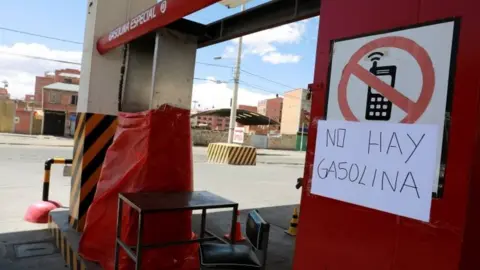Bolivia crisis: Food and fuel shortages as death toll mounts
Bolivian officials have flown basic provisions into the capital, La Paz, amid reports of food and fuel shortages.
The system, which officials want to roll out elsewhere, is a move to bypass road blockades erected by supporters of former President Evo Morales.
Mr Morales resigned on 10 November and later sought asylum in Mexico after facing claims of electoral fraud.
At least 23 people have been confirmed dead in ongoing political unrest.
Interim President Jeanine Áñez, who is herself facing calls to resign, said on Sunday that she would call new "transparent" elections soon to help re-establish the country's "democratic credibility".
The former deputy speaker of the Senate, who is a fierce critic of Mr Morales, declared herself interim leader on Tuesday after the president left the country.
 Reuters
ReutersHer predecessor faced protests over accusations he rigged a vote on 20 October to win re-election.
Jean Arnault, a UN envoy, has called for figures on both sides of the political divide to take part in crisis talks this week.
It came after UN human rights chief Michelle Bachelet warned Saturday that violence in the country could "spin out of control".
What is the situation on the ground?
There were long lines on the streets of La Paz on Sunday to get basic supplies such as chicken, according to Reuters news agency.
Presidency minister Jerjes Justiniano said the government has introduced an "air bridge" system to bypass road blocks in La Paz and it was hoping to do the same in other cities.
Protests have continued in many places, particularly around Cochabamba, where violent clashes between security forces and coca growers left nine dead on Friday.

Mr Morales described the deaths, which he numbered at 24, as "crimes against humanity" in a Twitter post.
Some coca-growing unions based in his strongholds set a deadline for Ms Áñez to step down by late on Monday.
But a number of nations, including the US and the UK, have recognised the interim government.
The EU's ambassador to Bolivia, León de la Torre, met with Ms Áñez on Sunday and offered support to ensure "credible elections... under the most stringent international standards".
Days into the role, Ms Áñez has already started to break ties with Mr Morales's regional left-wing allies.
On Sunday the government renamed the state newspaper, known as Change under Mr Morales, as Bolivia, according to Reuters.
How did we get here?
Mr Morales, a former coca farmer, took office in 2006 and became the country's first leader from an indigenous community.
He won plaudits for fighting poverty and improving Bolivia's economy but drew controversy by defying constitutional limits to run for a fourth term in October's election.
Pressure had been growing on him since contested election results suggested he had won outright in the first round.
The result was called into question by the Organization of American States (OAS), a regional body, which had found "clear manipulation" and called for the result to be annulled.
In response, Mr Morales agreed to hold fresh elections. But his main rival, Carlos Mesa - who came second in the vote - said Mr Morales should not stand in any new vote.
The chief of the armed forces, Gen Williams Kaliman, then urged Mr Morales to step down in the interests of peace and stability.
Announcing his resignation, Mr Morales said he had taken the decision in order to stop fellow socialist leaders from being "harassed, persecuted and threatened".
As the deputy Senate leader, Ms Áñez took temporary control of the body last Tuesday after Bolivia's vice-president and the leaders of the senate and lower house resigned.
That put her next in line for the presidency under the constitution.
The appointment of Ms Áñez, an opposition senator, as interim leader has been endorsed by Bolivia's Constitutional Court.
Ms Áñez previously told the BBC that her exiled predecessor should face prosecution if he returned to the country.
